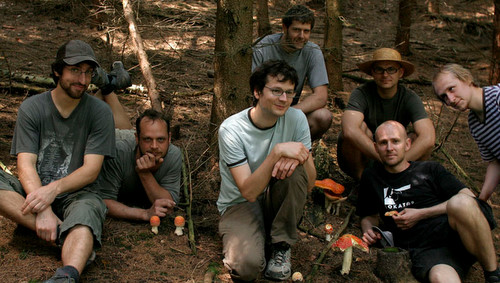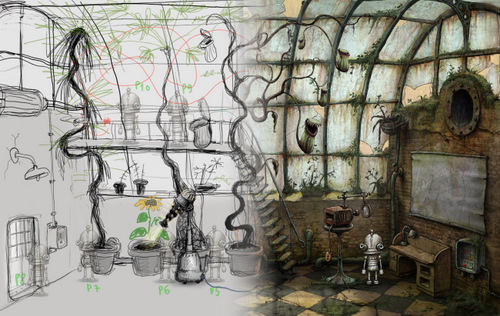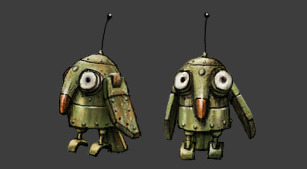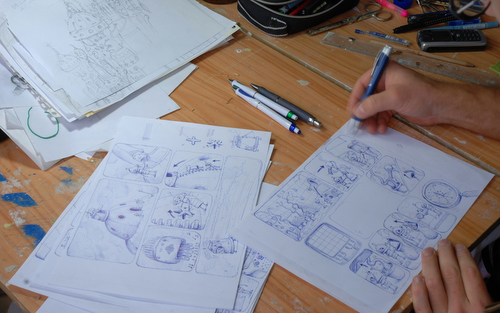Machinarium’s XBLA Refusal and more: The original interview with Amanita Design’s Jakub Dvorsky
This interview was conducted at the Casual Connect 2010 conference in Hamburg. It was used for a short article that created a lot of buzz about Microsoft turning down the chance to publish Machinarium on Xbox Live Arcade by Microsoft. Although our focus is Xbox Live Arcade related content, our editorial staff agreed that the following is an exception due to the recent circumstances.
Jakub Dvorksy, currently the lead designer at the Czech indie studio Amanita Design, is the original founder of the studio and brought together the team of creatives and artists that have been responsible for the highly acclaimed point and click adventure Machinarium. We recently had the pleasure of talking to this self-taught leader and look back at the history of the little studio in the Czech Republic.
The little Czech indie versus the world
Dvorsky has been building video games for 16 years ever since highs school. Used to working solo, Dvorsky first tasted fame while working on his critically acclaimed thesis project, Samorost. He quickly decided to plan a sequel and chose to invite a befriended animator and sound designer to work on it. This ended up laying the first foundations of Amanita Design. With Machinarium, Dvorsky managed to grow his team to a total of seven people. “I want to continue and grow a bit more,” he stated “But we want to stay small and focused.”
Amanita Design consists of Vaclav Blin as the lead animator, David Oliva as the lead programmer, painter Adolf Lachman, Jara Plachy as the second animator, sound designer Tomas ‘Pif’ Dvorak, musician Tomas ‘Floex’ Dvorak and Dvorsky himself a designer and director, The team used Machinarium to bring the studios’ already established visual style to the masses.
“For us it’s important to talk about our work and everybody considers the project as their own. […] I’m really happy that the team is really cool right now and I’m proud that I’ve put together this great bunch of people.”
Not everyone is born as a leader, but the proud Dvorsky proves to have the right skills to lead his team of artists and developers to victory. Doing so, he had to sacrifice his own work as a programmer on the project in order to manage the studio and take on the marketing activities for Machinarium. Having his team fully consist of good friends has surely made this easier for him.
“I’m still the boss, but I don’t behave like it. I carefully listen to everybody and it’s easy if the team is so small. Everybody is professional and my friend at the same time, but it was difficult to put together the whole team and now I’m very proud of myself that I was able to convince these people to work with me. That’s the biggest thing for me.”
Building momentum for Machinarium wasn’t the easiest thing for Dvorsky to do. When he and his team announced the game two years ago, they quickly built a website, released some screenshots and published a trailer. They tried to do as many interviews about the game as quick as possible and ended up sending it in for the Independent Game Festival.
“We eventually won [an IGF award] in the art direction category. It was great and helped us a lot. It looked quite simple, but was a lot of work. We were also at PAX, where I presented the games for three days. It was just before the release and really helped a lot. We also have quite a big fan base already from our previous games, so they also helped a lot spreading info about it all over the Internet.”
Having to promote yourself internationally as a small game studio in the Czech Republic isn’t the easiest thing to do. Especially if almost your entire team doesn’t speak English. The opportunity to suddenly travel all over the world to conferences like the Game Developers Conference and the Penny Arcade Expo gave Dvorsky and his team the right amount of exposure to conquer the global market that they needed. Any barriers in either language and distance his team was facing, were finally broken.
“It’s doesn’t matter where you are based anymore. It makes sense to focus on the global market. Of course it has some drawbacks, since all the main events like GDC or PAX are quite far from our home. An advantage for us are the much lower costs of living here in the Czech Republic compared to Western Europe or the United States. We are self funded, so its quite important to keep our budget low and spend little money on the whole game. We’ve been working on it for three years and had some savings, but most people have jobs on the side. Only three of us work full time.”
The critical acclaim that Machinarium received made sure the sales were “above expectations” according to Dvorsky. While no sales numbers have been made public by Amanita, the studio’s website has been the biggest source of income. While everyone is already familiar with the 70% revenue developers get from sales on Steam, Dvorsky has a much better percentage from a completely different source. “We get a 90% share of the final price on our website, which is awesome,”Dvorsky admits. At the same time, Machinarium has also hit the shelves of retail businesses in both Germany and Russia.
“Machinarium will also be released in the UK, Australia and other countries in March by Mamba games. Hopefully we’ll also reach the United States very soon. But of course, the percentage we get from retail is very small part of the pie. It’s very nice to have the game physically in the box.”
Every cunning indie with a big title on their name seems to have picked 2010 as a year to starting porting their work to different platforms. Amanita is one of them and is considering to bring the magic of Machinarium to both console and iPhone public.
“Porting is a very difficult process. It’s quite easy to get it to the iPhone if you manage to create a port yourself, but for consoles its very different. By the way, Microsoft just refused Machinarium for XBLA after a half year of talking with them. They like the game and know it would be very successful on their platform, but they don’t want to support games which aren’t Microsoft exclusives. Machinarium isn’t, since we’ve also released versions for Mac and Linux. We have another option to approach some big publisher to bring the game to XBLA, which is quite absurd to do and lose maybe a large part of revenue because of that.”
If all that porting is really worth the effort, one could consider this tiresome porting process to be applicable for other developers. Dvorsky admits that without having the success and momentum that he and his team have received from Machinarium, it would have never come to having retail versions and considering console ports. Piracy on PC games is one of the strongest reasons that his team is prepared to invest resources in other platforms, but the damages to Amanita’s revenues because of piracy seems to have remained limited.
“It’s very hard to measure hoe often our game is pirated. If you look on Google, you will find enough links to get the game that way. It’s also very nice to see that there’s a lot of people willing to pay and support us to make new games.”
Dvorsky also sees the bright side of how the game gets more promotion through piracy. Instead of fighting off pirated copies of his game, he and his team focused their energy into spreading Machinarium to stores around the world and even other platforms. “I know of a lot of cases where people are writing us that they pirated our game and then paid for it. They thanked us for the game and I’m really glad there are enough people to keep us alive and fund our independent work.”
You could call Dvorsky quite the optimist at this point, but it seems that he and his team were able to avoid any damages caused by piracy as a small indie studio. It made him proud to know that his team of developers have managed to keep on working on games independently.






April 12, 2010
I'm currious to know what the actual revenue breakdown picutre looks like in a normal publisher relationship. 90% seems like a lot…
April 13, 2010
[…] This post was mentioned on Twitter by XBLAFans. XBLAFans said: Want to learn what it is like to be an indy game developer? Check out this interview with Amanita Designs. http://cot.ag/cN8CRO ^JL […]
April 13, 2010
Yeah. Considering such a high share from your own website, it's easy to understand their position towards conventional publishers. I guess it comes down to figuring out which distribution channels are worth the time and effort. Sadly for Machinarium, XBLA apparently isn't.
April 13, 2010
Joystiq is reporting that they are looking toward PSN.
April 14, 2010
[…] original quote from Mr. Dvorsky, via XBLAFans, which has a wonderful interview up as well, that seems to have stirred up so much controversy in the gaming world is as […]
December 11, 2010
Krons disease percocet….
Percocet. Percocet addiction. Percocet 15….
July 23, 2011
Great website…
[…]we like to honor many other internet sites on the web, even if they aren’t linked to us, by linking to them. Under are some webpages worth checking out[…]………
July 23, 2011
Great website…
[…]we like to honor many other internet sites on the web, even if they aren’t linked to us, by linking to them. Under are some webpages worth checking out[…]………
July 25, 2011
Visitor recommendations trackback……
[…]one of our visitors recently recommended the following website[…]………
July 29, 2011
WOW! check this out!……
Amazing Post, worth a read……
July 29, 2011
Blogs you should be reading……
[…]Here is a great blog you might find Interesting that we encourage you[…]……
July 29, 2011
Check this out……
[…] that is the end of this article. Here you’ll find some sites that we think you’ll appreciate, just click the links over[…]………
July 29, 2011
You should check this out……
[…] Wonderful story, reckoned we could combine a few unrelated data, nevertheless really worth taking a look, whoa did one learn about Mid East has got more problerms as well […]………
July 30, 2011
Great website…
[…]we like to honor many other internet sites on the web, even if they aren’t linked to us, by linking to them. Under are some webpages worth checking out[…]………
August 8, 2011
Awesome website……
[…]the time to read or visit the content or sites we have linked to below the[…]………
August 8, 2011
You should check this out……
[…] Wonderful story, reckoned we could combine a few unrelated data, nevertheless really worth taking a look, whoa did one learn about Mid East has got more problerms as well […]………
August 9, 2011
Websites worth visiting……
[…]here are some links to sites that we link to because we think they are worth visiting[…]………
August 9, 2011
Our Trackback……
[…]very few websites that happen to be detailed below, from our point of view are undoubtedly well worth checking out[…]………
August 9, 2011
You should check this out……
[…] Wonderful story, reckoned we could combine a few unrelated data, nevertheless really worth taking a look, whoa did one learn about Mid East has got more problerms as well […]………
August 10, 2011
Sites we Like………
[…] Every once in a while we choose blogs that we read. Listed below are the latest sites that we choose […]………
August 17, 2011
You should check this out……
[…] Wonderful story, reckoned we could combine a few unrelated data, nevertheless really worth taking a look, whoa did one learn about Mid East has got more problerms as well […]………
August 17, 2011
Blogs you should be reading……
[…]Here is a great blog you might find Interesting that we encourage you[…]……
August 17, 2011
You should check this out……
[…] Wonderful story, reckoned we could combine a few unrelated data, nevertheless really worth taking a look, whoa did one learn about Mid East has got more problerms as well […]………